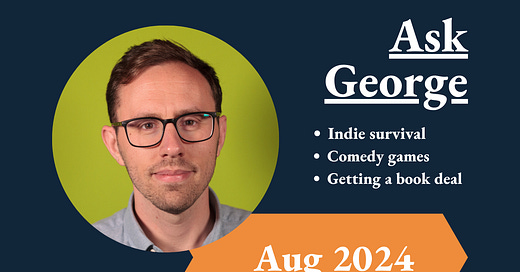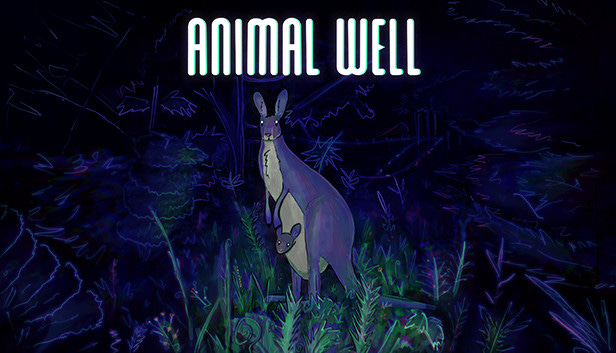Ask George, August 2024
How are indies surviving, how do you get a book deal and comedy video games
How are indie developers keeping alive in a tough market?
Why did a handsome devil such as me get a book deal?
And whaddya make of Thank Goodness You’re Here?
Good morning VGIM Insiders,
It’s the second Friday of the month, which means it is time for another Ask George column.
As per usual, this piece works in the following simple way:
You ask me the questions you want answered about the games biz.
I pick a handful out and tackle them to the best of my ability.
We all bask in a warm shared glow together.
Essentially, Ask George is your chance to consult with me on a one-off question without having to navigate my increasingly rammed diary. Handy, eh?
If you’d like to read Ask George in full, you can do so by buying a VGIM Insider membership that gives you extra content, first dibs on events and access to our little Substack chat community to talk shop.
And as a result of me popping up on the Indie Game Movement podcast to talk media strategies for growing game developers, you can use their special promo code INDIEGAMEMOVEMENT to get 20% off Insider - provided you buy before the end of August via the button below.
So without further ado, let’s turn to the first question in the VGIM mailbag.
How are indies surviving in the current climate of risk averse financiers? - Rich
2024 has been a challenging year. The financial turmoil in the games sector has made it heavy going for pretty much everybody, with indie developers stuck in the middle of a market which - to paraphrase Mike Rose from No More Robots speaking to Game Developer earlier this week - is “fucked”.
And the wider market conditions that have led to major cuts and lay-offs at the biggest studios (i.e. the pandemic video games boom receding, investment slipping out of the market, costs going up due to the effect of increases in inflation etc) has obviously hit independent developers too - with a grim piece in Wired indicative of the challenges that this year has brought.
But from the conversations I’ve had with indies, there seem to be three main ways that indies have changed course to survive in this tougher industry landscape.
The first, somewhat predictably, is to pare back costs as much as possible. In practice, this has included cutting plans to hire, getting the core founding team to take on more work and trying to lean more on either their publisher or ‘fractional’ experts to keep the show on the road while cutting back elsewhere.
Next, developers are unsurprisingly looking for sources of income to prop the business up. I’ve spoken to a number of indies who’ve taken on outsourcing or co-development work to pay the bills, while one business I chatted to essentially opened a ‘corporate’ arm to apply their game development skills to projects outside the industry.
Finally, a lot of indies have adapted to the market by rescoping or readjusting their projects to fit the cooler landscape in an effort to capture publisher interest before their internal runways, well, run out.
It’s undoubtedly a tough time for indies. But as a relentless optimist - much to the annoyance of people who know me - there are a couple of reasons to be cheerful.
First, funding is coming back into the market in places that are particularly useful for independent studios.
Investment firm Konvoy found that early stage funding in the games sector hit a one year high of $492m in Q2 2024, as firms back experienced talent who’ve spun out off the back of lay-off-mageddon.
And though this is one slice of the funding pie, it backs a wider sense amongst indies that I’ve spoken to that the people ploughing cash into that part of the industry - including publishers - are returning to the table.
And second, the success of indie games like Animal Well, Balatro and Thank Goodness You’re Here (more on that later) has provided some much needed confidence to underpin that investment - boosting developers who are pitching carefully scoped projects at the moment.
So for now, survival is the word on the lips of independent developers at the moment. But a reset is often a good time to go back to basics.
And companies who have good game ideas, a clear understanding of the market they’re creating for, the right team and a tight grip on the finances can ride the wave of some of this year’s successes - helping them through an extraordinarily tough time in the process.
How did you get a book deal? - Michael
Keep reading with a 7-day free trial
Subscribe to Video Games Industry Memo to keep reading this post and get 7 days of free access to the full post archives.






